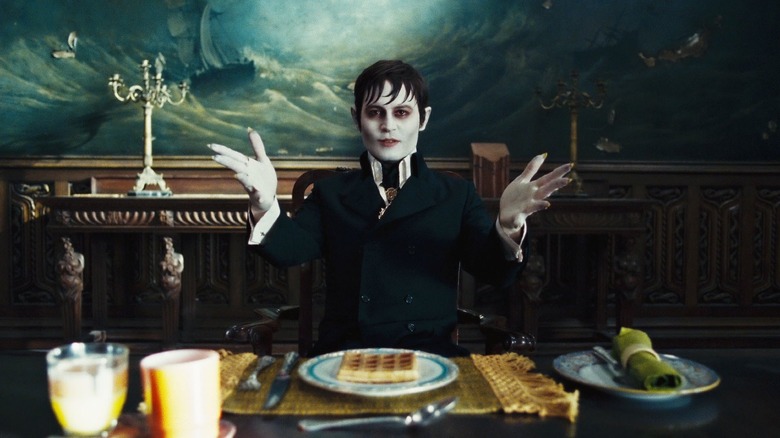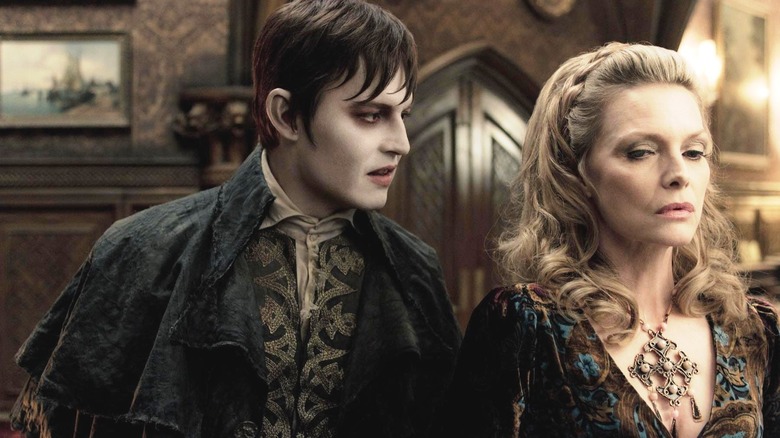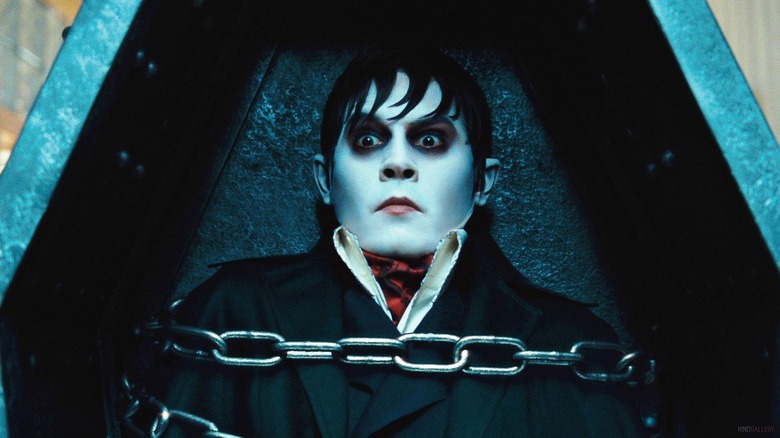The Johnny Depp Horror Film That Deserves More Attention
Traditional, long-running soap operas once ruled daytime TV with an iron fist. Since many soaps ran for multiple decades, multiple generations of kids had the gleeful experience of watching contraband adult dramas on the days they were home sick from school, and then, when they grew up, catching up with those same dramas unfettered when they worked at home. In 2022, only four major soaps remain: "The Bold and the Beautiful," "Days of Our Lives," "The Young and the Restless," and "General Hospital." May they never die
And speaking of never dying, one of the more bizarre soap operas to have emerged in the 1960s was Dan Curtis' "Dark Shadows."
"Dark Shadows" originally debuted on ABC on June 27, 1966, but it wasn't until the introduction of the character of Barnabas Collins (Jonathan Frid) in April of 1967 that the show took off in popularity. Barnabas was a 200-year-old vampire who carried a great deal of bitter resentment for his long-lost love/wife/rival Angelique (Lara Parker), as well as a heaping handful of angst for his long-dead human wife Josette (Kathryn Leigh Scott and Mary Collins). "Dark Shadows" took place over multiple timelines and, in the true tradition of soap operas, followed enormously circuitous plots of love, sex, betrayal, and family secrets. The series only lasted six seasons — a very short life as soap operas go — but remained entrenched in the popular consciousness long enough to be rebooted in 1991, and again in 2004.
The original "Dark Shadows" was notorious for its cheapness and stagey, low-budget look. As it was a daily program, shooting schedules were breakneck affairs (there were 1,225 episodes in the original run!), so errors were common. One can read any number of fan-made online compilations of "Dark Shadows'" production problems.
In 2012, director Tim Burton and screenwriter Seth Grahame-Smith adapted "Dark Shadows" to the big screen. With the popularity of soap operas on the wane, however, the filmmakers felt it was their responsibility to pull triple duty: Burton and Grahame-Smith constructed a film that was equal parts Gothic horror, stagey artificial soap revival, and broad slapstick farce. It's surprising how well "Dark Shadows" succeeded on all three fronts.
The new Barnabas Collins
The premise of Tim Burton's film is downright straightforward when compared to the convoluted machinations of the original TV show: In 1760, a young Barnabas Collins (Johnny Depp), the wealthy heir of a local industry family, spurns the romantic advances of his house servant Angelique (Eva Green). Angelique, secretly a witch, will kill Barnabas' parents in retaliation and curses Barnabas so that every person he ever loves will die. Barnabas sees the curse play out when his fiancée Josette (Bella Heathcote) throws herself off a cliff. In an attempt to take his own life, Barnabas is foiled by being transformed into a vampire. He's attacked by the locals and buried alive, only to be exhumed in 1972 (by a construction crew building a new McDonald's), still alive, and now having to contend with a modern world he does not understand.
And, yes, Barnabas immediately falls in love with a woman named Victoria who just happens to look exactly like his fallen Josette (and who is also played by Bella Heathcote). Barnabas moves back into his now-dilapidated family estate Collinwood, and sets about restoring the family to its former glory from 200 years previous, having to form uneasy alliances with his surviving descendants, most notably Elizabeth (Michelle Pfeiffer), the family's matriarch. Barnabas also has a Renfield-like servant (Jackie Earle Haley), a shrink (Helena Bonham Carter), a sniveling brother-in-law (Johnny Lee Miller), and a snarky teen niece (Chloë Grace Moretz) who is having none of this. Oh yes, and Angelique is still alive and is still carrying a torch for Barnabas. When Angelique and Barnabas make love, they get so excited they defy gravity.
There are secret passages, dramatic reveals (at least one of the previously mentioned characters is a werewolf), and cold, stagey (hilarious) declarations of intent. Also, there's a ghost. And Alice Cooper, playing himself.
A delicate balance of horror and comedy
"Dark Shadows" wasn't much of a hit when it was released in May of 2012, earning under $30 million in its opening weekend on a $150 million budget. Critics weren't too kind either, and "Dark Shadows" currently enjoys a mere 35% approval rating on Rotten Tomatoes. Critic J. Hoberman cited the film's overabundance of characters and complicated plot as detriments, mirroring other critics' general sentiment.
What fans of soap operas already knew, however, was that complicated plots and an overabundance of characters were a feature, not a bug. Several scenes in Burton's film deliberately highlighted melodramatic acting and silly dialogue, knowing that rushed performances, unrehearsed lines, and bad sound were part of the original show's charm. When Barnabas and Elizabeth meet for the first time, it is a masterclass in soap opera acting.
The fish-out-of-water humor is indeed quite silly, and the juxtaposition of Barnabas interacting with '70s iconography may feel obvious, but that doesn't make it unfunny. Burton and Depp nailed a very strange meta-joke. If soap operas are dying out, it would take the angst and weirdness of an honest-to-goodness Tim Burton-designed vampire to get it going again. Over the course of the film, characters slowly begin to realize, perhaps, that they are indeed inside a soap opera. In a weird way, "Dark Shadows" become self-aware by its conclusion.
Additionally, there is a great deal of pleasure to be had watching such talented actors vamp it up. Characters gnash the scenery, deliberately overact, and throw themselves into roles they feel relieved to be occupying. Burton had previously worked with Depp, Pfeiffer, Carter, and would go on to work with Greene again in future films, making "Dark Shadows" something of a family affair unto itself.


